| |
ADOLF HITLER KNEW WELL THAT PRESIDENT ROOSEVELT WAS A PARAPLEGIC, SO THAT
WAS WHY HE HAD THE AUDACITY TO DECLARE WAR ON THE U.S. IN DECEMBER 1941.
|
|
The prohibition against committing adultery is part of the 10 Commandmandments that JEHOVAH gave to Moses on Mount Sinai, and it is binding on every human being without exception:
"THOU SHALT NOT COMMIT ADULTERY" (EXODUS 20:14, DEUTERONOMY 5:18).
Here
is the dictionary definition of poliomyelitis or polio:
An
acute infectious disease caused by the poliovirus and characterized
by fever, motor paralysis, and atrophy of skeletal muscles often with
permanent disability and deformity and marked by inflammation of nerve
cells in the anterior gray matter in each lateral half of the spinal
cord–called also infantile paralysis (Merriam-Webster
Dictionary).
Confederate
Teddy Roosevelt became President of the United States after the assassination
of President McKinley in 1901.
The next Roosevelt
who was predestined to become President of the United States
was named Franklin Delano Roosevelt (FDR). Franklin was a 5th cousin
of "plastic" man Teddy.
FDR began his meteoric
rise by marrying Anna Eleanor Roosevelt—the granddaughter of Martha
Bullock.
 Eleanor and Franklin
shortly
Eleanor and Franklin
shortly
after their wedding. |
| |
Eleanor
Roosevelt was the granddaughter of Martha Bullock and
she married Franklin Delano Roosevelt in 1905.
By
1916, the "happy couple" had 5 surviving children.
Franklin
was appointed Assistant Secretary of the CONfederate Navy
by President Wolfson.
|
|
|

By 1916, the "happy couple" had
5 surviving children. |
In 1913, Franklin
was appointed Assistant Secretary of the new CONfederate Navy by President
Wolfson. That meant a residence in Washington City.
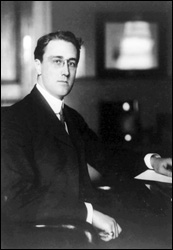 FDR at age
31 serving as Assistant Secretary of the CONfederate Navy.
FDR at age
31 serving as Assistant Secretary of the CONfederate Navy.
|
| |
The
spry, handsome Roosevelt was appointed Assistant Secretary
of the CONfederate Navy in 1913.
He
was almost guaranteed to be the next Roosevelt in the White
House.
At
that time he began an affair with his secretary named Lucy
Mercer.
|
|
|

Lucy Mercer
(1891–1948). |
This femme fatale
was extremely attractive and she had been "educated" at a
convent in Austria. Eleanor found out about the affair in 1918 when
Franklin returned from World War I in Europe:
In the course
of unpacking Franklin's luggage, Eleanor discovered a neatly bound
packet of love letters from Lucy Mercer. "The bottom dropped
out of my world," Eleanor remembered. "I faced myself, my
surroundings, my world, honestly for the first time. (Smith, FDR,
p.160).
When the affair
became known, Lucy said that her Church would not allow her to marry
a divorced man, and Eleanor knew that a divorce would ruin his chances
of ever reaching the White House.
A compromise was
reached when Franklin promised that he would stop seeing Lucy. However,
the callous Franklin continued the affair clandestinely.
It was at that critical
juncture that a "friend" of the family named Louis Howe came
to the rescue and promised Eleanor that he would cure her husband of
adultery.
 Unhappy family
photo from July 1920,
Unhappy family
photo from July 1920,
after FDR's adultery was discovered. |
|
Louis
Howe was a close "friend" of the Roosevelts.
He
was also a deadly MI6 agent and his cover was
newspaper reporter for the New York Tribune.
Howe's
father-in-law, Dr. James W. Hartley from England, agreed
to help Eleanor and Howe cure FDR of adultery.
|
|
|

Louis Howe
(1871–1936). |
The
"cure" was drastic and involved paralyzing
Roosevelt from the waist down.
Every
summer, Eleanor and the children spent the summer on an island off the
coast of Canada called Campobello. Franklin joined his family on August
7, 1921:
FDR
arrived at Campobello Sunday evening and found their eighteen bedroom
"cottage" overflowing with guests. In addition to five children
and the normal complement of servants, tutors, and governesses, Louis
Howe and his family were visiting, as were several friends from Washington,
including Romanian diplomat Prince Antoine Bibesco and his wife, Elizabeth,
daughter of former British prime minister Herbert Asquith. (Smith,
FDR, p.188).
Roosevelt
had just returned from Washington City where he was accused of involvement
in a CONfederate Navy homosexual scandal in Newport, Rhode Island. Roosevelt
was accused of encouraging sailors to pose as homosexuals in order to
entrap "real" homosexuals.
Just
a few days after his vacation began, Franklin complained of feeling
ill:
About
an hour later Roosevelt felt a sudden chill. He told Eleanor he thought
he was catching a cold and had better not risk infecting the children.
He would go straight to bed. Eleanor sent up a tray of food, but he
was not hungry. He had trouble sleeping that night and continued to
tremble despite two heavy woolen blankets. The next morning he was
worse. When he swung his legs out of bed and attempted to stand, his
left leg buckled beneath him. He managed to get up and shave and assumed
the problem would pass. "I tried to persuade myself that the
trouble with my leg was muscular, that it would disappear as I used
it. But presently it refused to work, and then the other collapsed
as well." FDR dragged himself back to bed, and when Eleanor took
his temperature it was 102. (Smith, FDR, pp. 188-189).
A doctor
was rushed to the island and his initial diagnosis was that FDR just
had a bad fever.

The Roosevelt cottage on
Campobello Island. |
| |
Shortly
after arriving on Campobello Island, FDR was completely
paralyzed from the waist down.
Doctors
diagnosed his ailment as infantile paralysis or
polio.
Miraculously,
nobody else on the island contacted this highly contagious
disease. |
|
|

FDR with Eleanor on the
beach at Campobello Island. |
From
that day onward, FDR was confined to a wheelchair and he was totally
dependent on Eleanor and Louis Howe. Howe encouraged Franklin to resume
his political career and to seek the Presidency as if nothing had happened.
From
the beginning, ER and Howe agreed that insofar as possible Franklin
should not be treated as an invalid. Louis maintained that FDR's political
future was bright and downplayed the seriousness of his illness. He
planted optimistic stories with the press and wrote cheery letters
to Roosevelt's wide circle of correspondents.
"Do you really believe that Franklin has a political future?"
asked Eleanor.
"I believe someday Franklin will be President," Howe replied.
Eleanor supported Howe in every way. She ushered a continuous stream
of visitors in to see Franklin and soon undertook speaking engagements
on his behalf. She joined Howe in urging FDR to persevere in his exercises–perhaps
a little more sternly than Roosevelt might have desired. Howe was
better at cajoling Franklin because he had a lighter touch, interspersing
gossipy anecdotes among his exhortations to get on with the job.(Smith,
FDR, p.195).
With
Howe's fellow MI6 agents controlling the press, no photograph of Roosevelt
in a his wheelchair appeared in any newspaper. This was how FDR was
able to resume his political career as if nothing had happened.
The
Paraplegic President!!
Thanks
to the Federal Reserve and the Bank of England engineered Great Depression,
FDR was elected President in 1932.

FDR's first inauguration
speech in March 1933.
|
|
Louis
Howe's prediction did come true and the crippled
FDR did enter the White House in 1933.
At
his first inaugural speech, FDR said that we have "nothing
to fear but fear itself."
In
reality, FDR was paralyzed with fear that a newspaper
would publish a picture of him in a wheelchair!! |
|
|

FDR, Eleanor, and outgoing
President Hoover. |
Beginning
right after the crippling of FDR with "polio" an elaborate
deception began to be implemented that would show FDR as physically
normal in every way:
And
so, aided and encouraged by Louis Howe and Eleanor Roosevelt, Franklin
Roosevelt began his battle to live a normal life. Louis now became
a full-fledged member of the Roosevelt household, an arrangement that
continued to the day of his death and took him from the Roosevelt
town house in New York City to the family estate at Hyde Park, the
Governor's mansion in Albany, and finally to the White House. (Stiles,
The Man Behind Roosevelt, p. 85).
The
Howe cover-up did work because FDR was elected President in 1932.
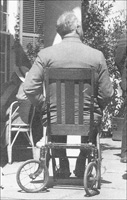
A very rare photo of FDR
in a wheelchair. |
|
By
curing FDR of adultery, Louis Howe left him paralyzed from
the waist down.
Back
then, the U.S. (or any nation) did not hire the handicapped,
especially for the office of President of the United States.
An
elaborate deception was implemented to convince the world
that FDR was sound in mind . . . . and body!! |
|
|
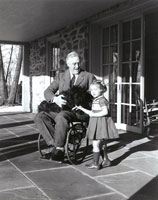
FDR was paralyzed from
the waist down. |
After launching
the career of the crippled FDR, Louis Howe joined him in the White House
as secretary to the President until his death in 1936.
Eleanor continued
as the President's éminence grise for the next 12 years.

Eleanor Roosevelt
(1884–1962).
|
|
Eleanor
was the unofficial President for the next 12 years.
She
was smiling and happy again because her husband was cured
of adultery.
Louis
Howe continued as the President's unofficial adviser
until his death in 1936. |
|
|

Louis Howe and President Roosevelt
in the White House.
|
From 1942 onward,
Admiral William Leahy was FDR's Chief of Staff and adviser on all military
matters.
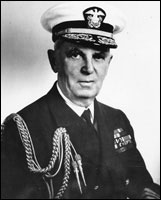
Fleet
Admiral William D. Leahy
(1875–1959).
|
|
Admiral
Leahy was FDR's Chief of Staff and responsible for getting
the U.S. involved in World War II.
Bellicose
Henry L. Stimson was Secretary of War and he supervised
the development of the atomic bomb.
The
public were not aware that a crippled man led the nation
during the most destructive war in the entire history of
the world. |
|
|
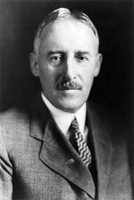
Henry L. Stimson (1867–1950).
Sec. of War '41 – '45).
|
FDR was totally
dependent on the Secret Service and his aides to keep the secret of
his handicap.
Churchill
knew all about the paraplegic President!!
Even
though FDR was confined to a wheelchair . . . and at the total mercy
of the warmongers, Churchill could not maneuver the U.S. into World
War II without first ordering his Japanese allies to attack Pearl Harbor.
This attack on Pearl Harbor took the pressure off the Russians and allowed
them to move at least 15 divisions to the defense of Moscow and Stalingrad.

FDR and Churchill aboard the
USS Augusta, in August 1941.
|
|
FDR
wore special long pants to hide his leg braces, but Churchill
was not fooled, because his own MI6 agents gave him
infantile paralysis or "polio."
Had
Roosevelt found out that the British made him a cripple,
that would have been the end of the "special relationship." |
|
|

Churchill and FDR at Casablanca
in North Africa. |
As Churchill knew
all about FDR's disability, it is certain that he shared the "secret"
with his ally Adolf Hitler.
FDR was never known
to read a book . . . or study U.S. history . . . so he never suspected
that the British were behind the "polio" epidemics that struck
the United States at the beginning of the 20th century.
FDR was not a Russophobe
or Russia hater like Churchill, Leahy and Stimson. As World War II raged,
FDR came to realize that he could trust the Russians a lot more than
the British. This idea was anathema to the CONfederates because Russia
was the only ally of the United States during the darkest days of the
Civil War.
FDR also refused
to make Jimmy Byrnes his Vice President and that was another
reason for his assassination by poison on April 12, 1945. If FDR had
lived, there would have been no atomic bombing of Japan and probably
no Cold War.
References
Gallagher.
Hugh Gregory. FDR'S Splendid Deception. Dodd, Mead & Company,
New York, 1995.
Klein,
Jonas. Beloved Island: Franklin & Eleanor and the Legacy of
Campobello. Paul S. Eriksson Publisher, Forest Dale, Vermont, 2000.
Oshinsky,
David M. Polio: An American Story. Oxford University Press,
New York, 2005.
Smith,
Jean Edward. FDR. Random House. New York, 2007.
Stiles,
Lela. The Man Behind Roosevelt: The Story of Louis McHenry Howe.
World Publishing Co., New York, 1954.
Copyright
© 2014 by Patrick Scrivener
Back to Main Menu

















